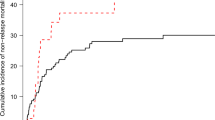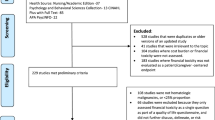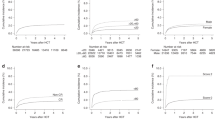Abstract
Addictive disorders are common and underdiagnosed in the general medical population. While it is well recognized that alcohol consumption is linked to cancers of the head and neck as well as the large bowel, its association with cancers for which hematopoietic SCT (HSCT) is a modality of treatment is not as clear. Further, the complications of alcohol or other drug addiction in patients undergoing HSCT has not been well studied. However, patients with comorbid substance use disorders (SUDs) are at higher risk for morbidity and mortality while undergoing HSCT due to medical sequelae of SUDs and issues of social support, adherence to treatment plans, and impairment of judgment and decision-making. Behavioral patterns of patients with SUDs are clearly relevant factors to consider in patient selection, management and outcome. We offer a review of the existing literature and recommendations for assessment and management of this patient population.
This is a preview of subscription content, access via your institution
Access options
Subscribe to this journal
Receive 12 print issues and online access
$259.00 per year
only $21.58 per issue
Buy this article
- Purchase on Springer Link
- Instant access to full article PDF
Prices may be subject to local taxes which are calculated during checkout

Similar content being viewed by others
References
Hochhausen N, Altmaier EM, McQuellon R, Davies SM, Papadopolous E, Carter S et al. Social support, optimism, and self-efficacy predict physical and emotional well-being after bone marrow transplantation. J Psychoso Oncol 2007; 25: 87–101.
Goetzmann L, Klaghofer R, Wagner-Huber R, Halter J, Boehler A, Muellhaupt B et al. Psychosocial vulnerability predicts psychosocial outcome after an organ transplant: results of a prospective study with lung, liver, and bone-marrow patients. J Psychosom Res 2007; 62: 93–100.
Kettman JD, Altmaier EM . Social support and depression among bone marrow transplant patients. J Health Psychol 2008; 13: 39–46.
Rodrigue JR, Pearman TP, Moreb J . Morbidity and mortality following bone marrow transplantation: predictive utility of pre-BMT affective functioning, compliance, and social stability. Int J Behav Med 1999; 6: 241–254.
Ballard HS . The hematological complications of alcoholism. Alcohol Health Res World 1997; 21: 42–52.
Heermans EH . Booze and blood: the effects of acute and chronic alcohol abuse on the hematopoietic system. Clin Lab Sci 1998; 11: 229–232.
Rehm J, Room R, Graham K, Monteiro M, Gmel G, Sempos CT . The relationship of average volume of alcohol consumption and patterns of drinking to burden of disease: an overview. Addiction 2003; 98: 1209–1228.
Chang G, Antin JH, Orav EJ, Randall U, McGarigle C, Behr HM . Substance abuse and bone marrow transplantation. Am J Drug Alcohol Abuse 1997; 23: 301–308.
Chang G, Orav EJ, Tong M-Y, Antin JH . Predictors of 1-year survival assessed at the time of bone marrow transplantation. Psychosomatics 2004; 45: 378–385.
Battaglioli T, Gorini G, Seniori Constantini A, Crosignani P, Miligi L, Nanni O et al. Cigarette smoking and alcohol consumption as determinants of survival in non-Hodgkin's lymphoma: a population-based study. Ann Oncol 2006; 17: 1283–1289.
www.niaaa.nih.gov/Resources/DatabaseResources/QuickFacts/AlcoholDependence/default.htm.
American Psychiatric Association. Diagnostic and Statistical Manual of Mental Disorders, 4th edn, Text Revision American Psychiatric Press, Inc: Washington, DC, 2000.
Stowe J, Kotz M . Addiction medicine in organ transplantation. Prog Transplant 2001; 11: 50–57.
McGlynn EA, Asch SM, Adams J, Keesey J, Hicks J, DeCristofaro A et al. The quality of health care delivered to adults in the United States. N Engl J Med 2006; 348: 2635–2645.
Moore RD, Bone LR, Geller G, Mamon JA, Stokes EJ, Levine DM . Prevalence, detection, and treatment of alcoholism in hospitalized patients. JAMA 1989; 261: 403–407.
Smothers BA, Yahr HT . Alcohol use disorder and illicit drug use in admissions to general hospitals in the United States. Am J Addict 2005; 14: 256–267.
Polednak AP . Documentation of alcohol use in hospital records of newly diagnosed cancer patients: a population-based study. Am J Drug Alcohol Abuse 2007; 33: 403–409.
Jowsey S, Taylor M, Schneekloth T, Matthew C . Psychosocial challenges in transplantation. J Psychiatr Pract 2001; 7: 404–414.
Hoodin F, Weber S . A systematic review of psychosocial factors affecting survival after bone marrow transplant. Psychosomatics 2003; 44: 181–195.
Hoodin F, Uberti JP, Lynch TJ, Steele P, Ratanatharathorn V . Do negative or positive emotions differentially impact mortality after adult stem cell transplant? Bone Marrow Transplantation 2006; 38: 255–264.
Hurcom C, Copello A, Orford J . The family and alcohol: effects of excessvie drinking and conceptualizations of spouses over recent decades. Substance Use Misuse 2000; 35: 473–502.
Mathew RM, Rosenfeld MR . Neurologic complications of bone marrow and stem cell transplantation in patients with cancer. Curr Treat Options Neurol 2007; 9: 308–314.
Diamond I, Messing RO . Neurologic effects of alcoholism. West J Med 1994; 161: 279–287.
Hamadeh R, Ardehali A, Locksley RM, York MK . Fatal aspergillosis associated with smoking contaminated marijuana, in a marrow transplant recipient. Chest 1988; 94: 432–433.
Coffman K . Substitute addictions and transplantation. Curr Opin Organ Transplant 1999; 4: 150–154.
Dermatis H, Galanter M . Clinical advances in pharmacological and integrated treatment approaches for alcohol and drug use disorders. Focus 2007; V: 141–150.
Twillman RK, Manetto C, Wellisch DK, Wolcott DL . The transplant evaluation rating scale: a revision of the psychosocial levels system for evaluationg organ transplant candidates. Psychsomatics 1993; 34: 144–153.
Hoodin F, Kalbfleisch KR . How psychometrically sound is the Transplant Evaluation Rating Scale for bone marrow transplant recipients? Psychosomatics 2001; 42: 490–496.
Hoodin F, Kalbfleisch KR . Factor analysis and validity of the transplant evaluation rating scale in a large bone marrow transplant sample. J Psychosom Res 2003; 54: 465–473.
Reinert DF, Allen JP . The alcohol use disorders identification test (AUDIT): a review of recent research. Alcohol Clin Exp Res 2002; 26: 272–279.
Lundberg JC, Passik SD . Alcohol and cancer: a review for psycho-oncologists. Psycho-oncology 1997; 6: 253–266.
Author information
Authors and Affiliations
Corresponding author
Rights and permissions
About this article
Cite this article
Stagno, S., Busby, K., Shapiro, A. et al. Patients at risk: addressing addiction in patients undergoing hematopoietic SCT. Bone Marrow Transplant 42, 221–226 (2008). https://doi.org/10.1038/bmt.2008.211
Received:
Accepted:
Published:
Issue Date:
DOI: https://doi.org/10.1038/bmt.2008.211
Keywords
This article is cited by
-
Survival protection of patients undergoing hematopoietic stem cell transplantation: grounded theory
Supportive Care in Cancer (2023)
-
History of drug use in allogeneic hematopoietic cell transplant recipients
Bone Marrow Transplantation (2021)
-
Cognitive function in patients prior to undergoing allogeneic hematopoietic stem cell transplantation
Supportive Care in Cancer (2021)
-
Patient eligibility for hematopoietic stem cell transplantation: a review of patient-associated variables
Bone Marrow Transplantation (2019)



